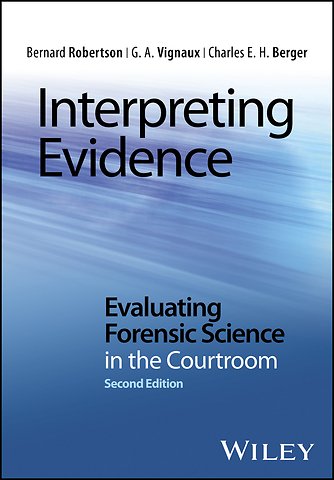Interpreting Evidence
Evaluating Forensic Science in the Courtroom
Gebonden Engels 2016 2e druk 9781118492437Samenvatting
This book explains the correct logical approach to analysis of forensic scientific evidence. The focus is on general methods of analysis applicable to all forms of evidence. It starts by explaining the general principles and then applies them to issues in DNA and other important forms of scientific evidence as examples. Like the first edition, the book analyses real legal cases and judgments rather than hypothetical examples and shows how the problems perceived in those cases would have been solved by a correct logical approach.
The book is written to be understood both by forensic scientists preparing their evidence and by lawyers and judges who have to deal with it. The analysis is tied back both to basic scientific principles and to the principles of the law of evidence. This book will also be essential reading for law students taking evidence or forensic science papers and science students studying the application of their scientific specialisation to forensic questions.
Specificaties
Lezersrecensies
Inhoudsopgave
1. INTRODUCTION
2. INTERPRETING SCIENTIFIC EVIDENCE
3. THE ALTERNATIVE HYPOTHESIS
4. WHAT QUESTIONS CAN THE EXPERT DEAL WITH?
5. EXPLAINING THE STRENGTH OF EVIDENCE
6. THE CASE AS A WHOLE
7. FORENSIC SCIENCE METHODOLOGY
8. ASSIGNING LIKELIHOOD RATIOS
9. ERRORS OF THINKING
10. FREQUENTIST STATISTICS AND DATABASE MATCHING
11. IMPLICATIONS FOR THE LEGAL SYSTEM
12. CONCLUSION
Index
Anderen die dit boek kochten, kochten ook
Rubrieken
- advisering
- algemeen management
- coaching en trainen
- communicatie en media
- economie
- financieel management
- inkoop en logistiek
- internet en social media
- it-management / ict
- juridisch
- leiderschap
- marketing
- mens en maatschappij
- non-profit
- ondernemen
- organisatiekunde
- personal finance
- personeelsmanagement
- persoonlijke effectiviteit
- projectmanagement
- psychologie
- reclame en verkoop
- strategisch management
- verandermanagement
- werk en loopbaan







